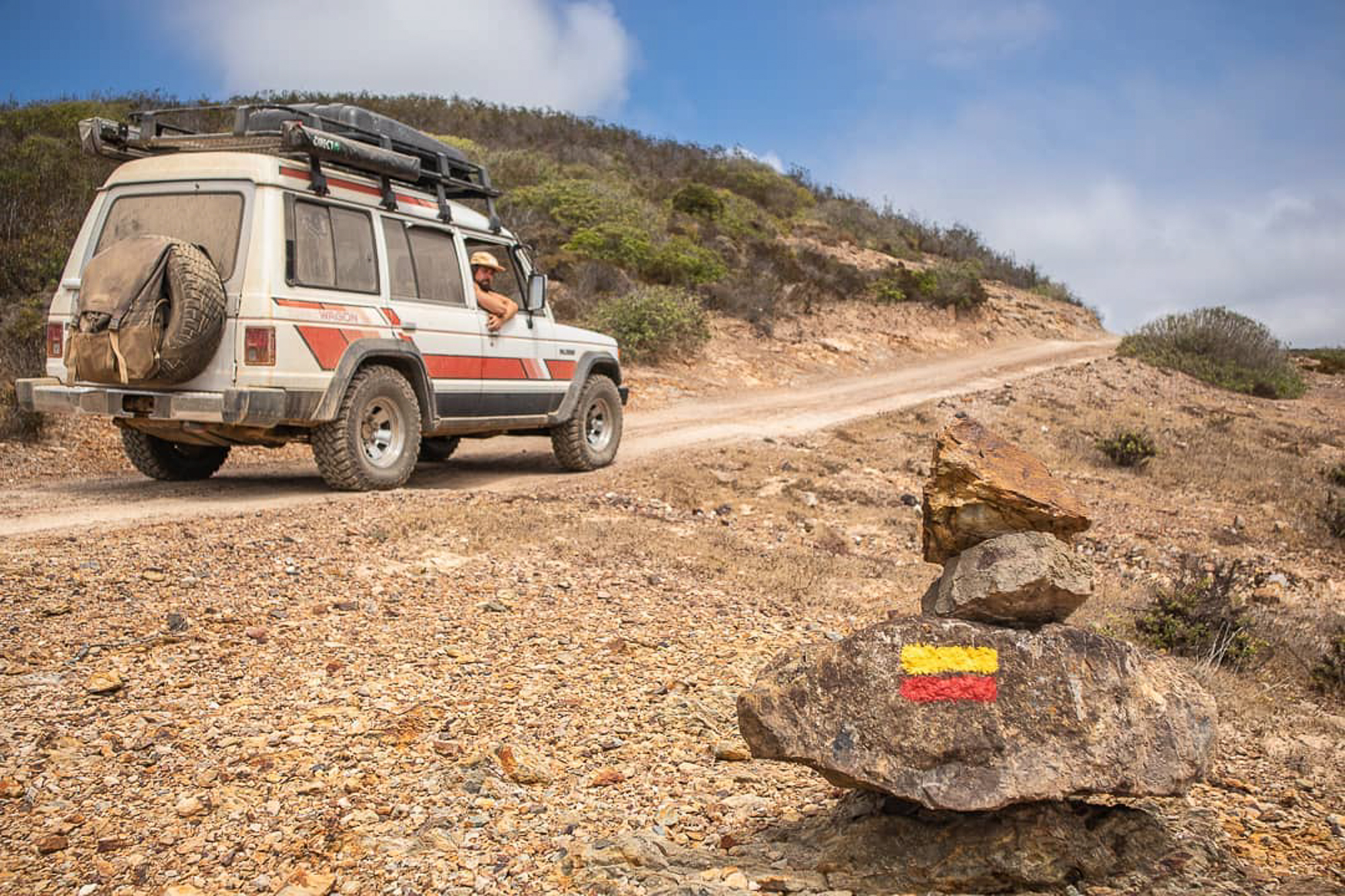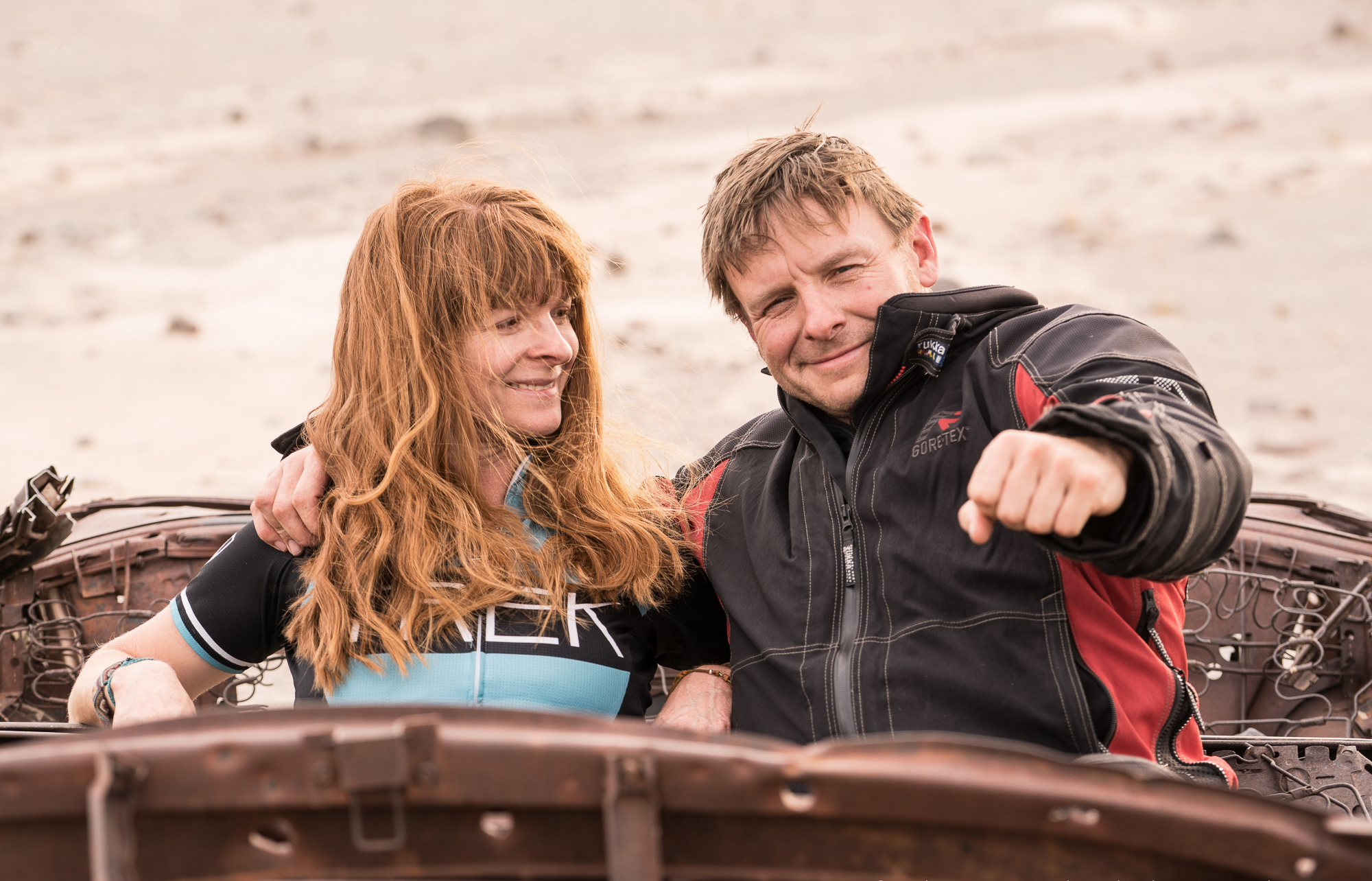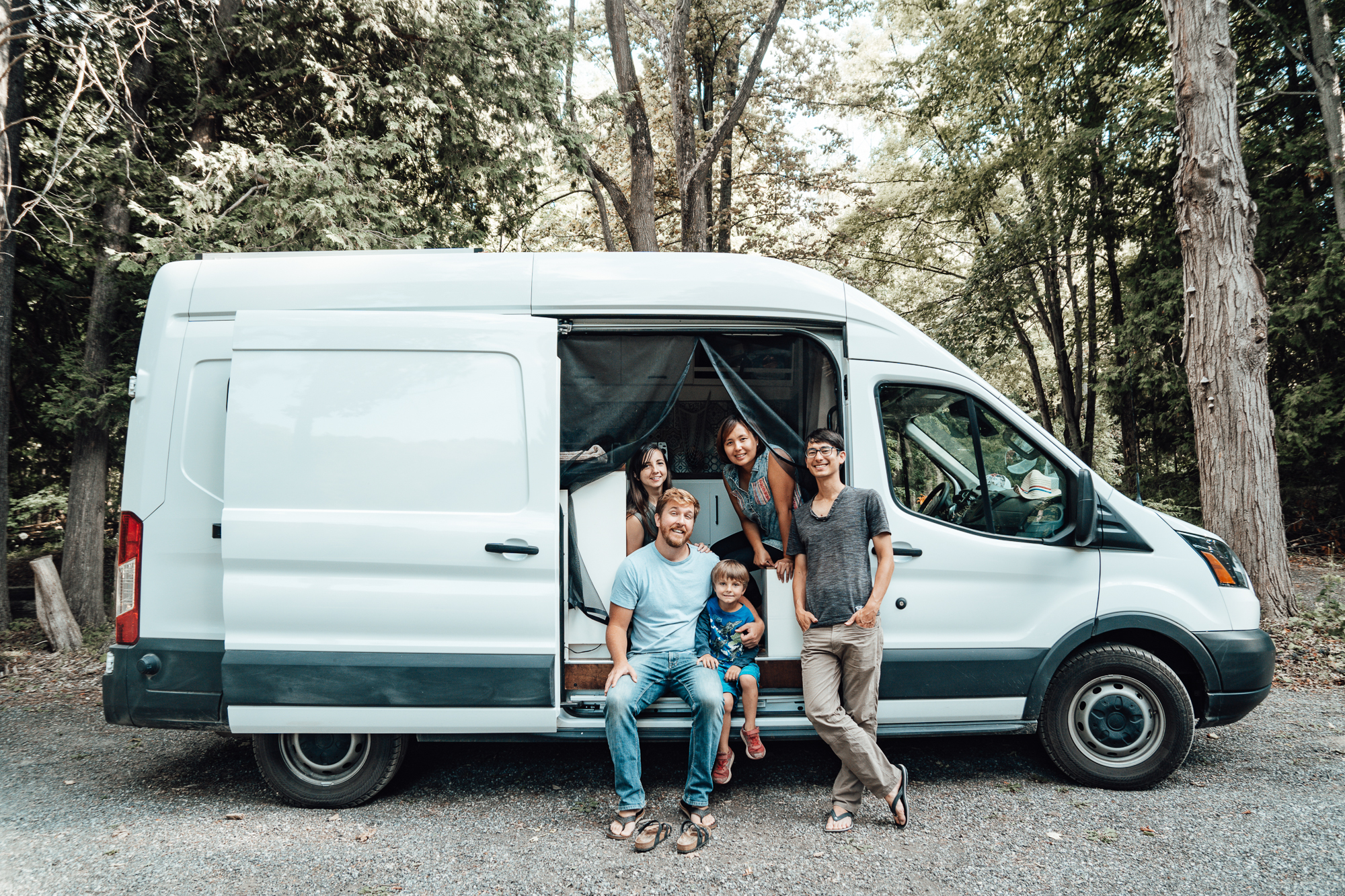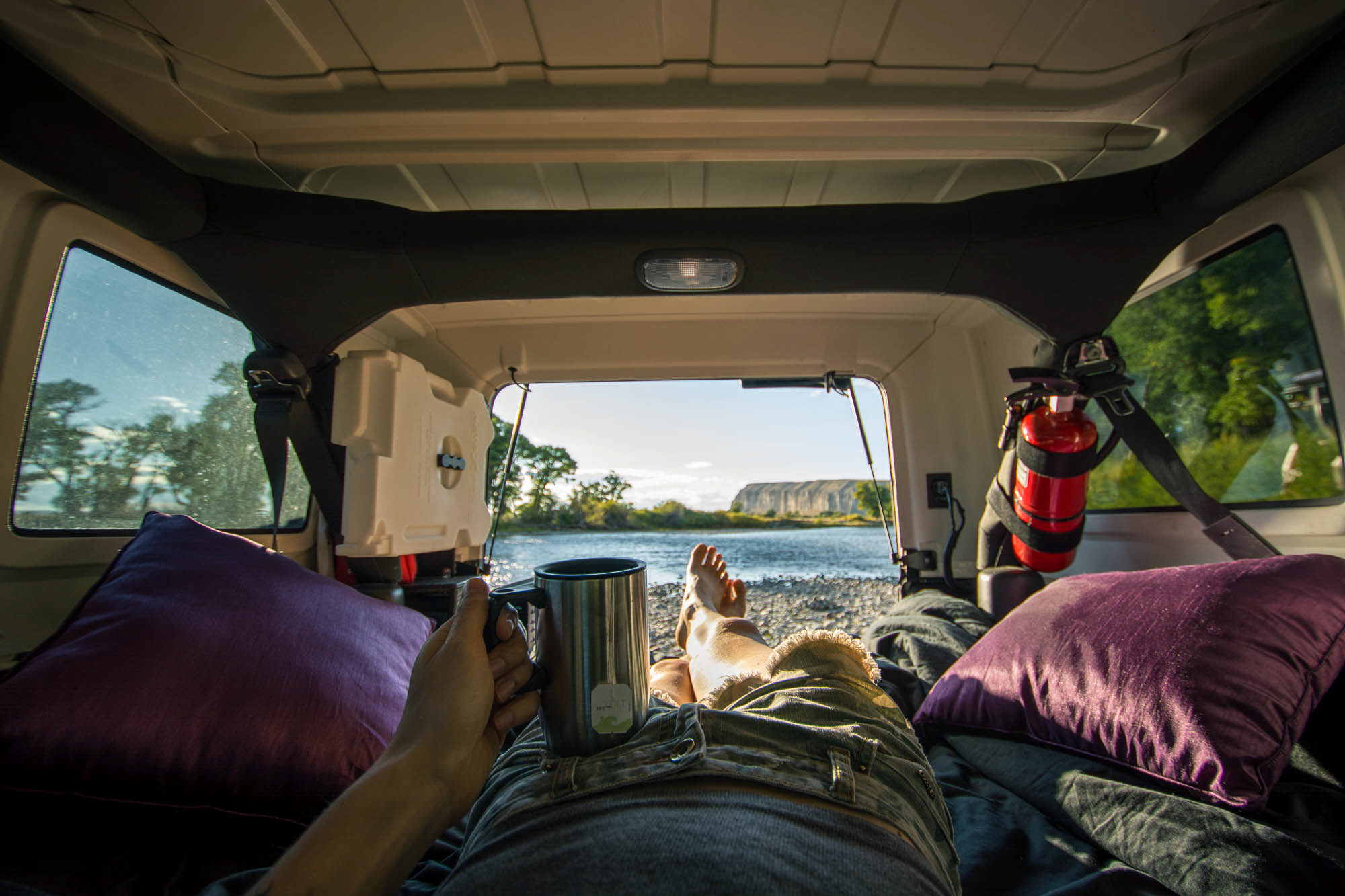Lead photograph by Joanie Pépin
Despite becoming more materially affluent over the past four decades, those living in developed countries have not experienced the happiness boost expected from modern materialism. Since the 1940s, we’ve upgraded significantly, installing showers and bathtubs, microwaves, dishwashers, and big-screen color televisions—purchasing twice as many vehicles per person, and adding boats and campers, iPads, and laptops galore. Yet, as psychologist David Myers, author of The Funds, Friends and Faith of Happy People, explains, “Compared with their grandparents, today’s young adults have grown up with much more affluence, slightly less happiness, and much greater risk of depression and assorted social pathologies.”
Fortunately, much research has been done on the subject, clarifying what makes human beings happy. It just so happens that as overlanders, we’ve had a head start.
We Prioritize Experiences Over Stuff
In 2014, Marcus and Julie Tuck set off for Africa in their Iveco Daily 4×4. Seven years later, they’ve traveled all over the world, including Antarctica, South and Central America, Mexico, the United States, and most recently, Canada. Whether they’re taking the Polar Plunge in the frigid Antarctic Ocean, crossing the Amazon Delta to French Guiana, or flying over snow-covered mountains and glaciers of the Kluane icefields in the Yukon, these two are all about experiences.
When it comes to overlanding, Marcus and Julie have two mottos: Nobody ever looked back and wished they had spent more time at work and There’s no point being the richest person in the graveyard.
Julie explains, “We definitely prioritize time over money and experiences over things. Experiences make us happy. Possessions can be taken, lost, or broken, but experiences remain in our memories forever. But the thing is with overlanding, many of our experiences, say hiking in Torres del Paine, gorilla trekking in Rwanda, or even just having a würst in Germany, weren’t free. So, we initially had to prioritize money over time before we could afford the experiences which we prioritize over possessions.”
An abundance of evidence indicates that compared to material purchases, experiential purchases (activities, events, fees and admissions, travel, outdoor activities) contribute to greater individual happiness in those whose basic needs have been met. In a 2003 study, Van Boven & Gilovich conducted a nationwide sample of over a thousand Americans, asking them to think of both a material and experiential purchase they had made with the intention of increasing their happiness.

The Tucks, exploring the Bolivian Altiplano, 2016. Photo credit: Marcus and Julie Tuck
Participants indicated that not only did the experiential purchase contribute to increased happiness, but they also viewed the purchase as a better financial investment. These findings were consistent over various demographic categories, including across varying ages, ethnicities, and political affiliations. And as Julie alluded to, there is evidence that memories of these experiences make us happy too. Studies show that merely recalling life experiences can enhance our well-being in a way that thinking about the stuff we’ve purchased cannot.
Experiences further benefit our well-being because they foster social connection, another factor that goes hand-in-hand with increased levels of happiness. Joanie, of the Traveling Beast, believes that keeping it simple during her Pan-American Highway trip led to more opportunities for social connection. “To go on my trip, I had to sell quite a lot of things…and this was seriously liberating. I didn’t have a phone or electricity on my journey, which allowed me to connect more deeply with the people I met. As a result, I believe that owning only the essentials not only reduced my stress level, it also made me a better, more open person.”

Making friends was one of the highlights for Joanie during the Carnaval de Cajamarca paint wars in Peru.
Another 2003 study by Van Boven & Gilovich paired university students and asked them to discuss either experiential or material purchases they’d made and were happy with. Those who discussed experiential purchases were more likely to say that they liked each other more, enjoyed talking to each other more, and were more interested in pursuing a friendship with their conversation partner. In addition, researchers examining the stigmatization of materialism in 2010 found that participants expressed positive stereotypes of experiential people, considering them to be more humorous, friendly, and open-minded than materialistic folks. If you want to make friends and influence people, keep telling those tales about surfing in Tofino, taking a tango lesson in Buenos Aires, or digging your sand-entrapped vehicle out from the dunes of the Sahara.
We’re Less Prone to Hedonic Adaptation
Human beings possess a remarkable capacity for adaptation. This serves us well when we’re moving to a new city, traveling through many different countries, or adjusting to life with a newborn. Unfortunately, we also adapt incredibly well and most quickly to that which doesn’t change and to which we are constantly exposed, most notably, material purchases such as couches, clothes, and cars. This tendency, getting used to the things that once made us happy, is referred to in the positive psychology realm as the hedonic treadmill, or hedonic adaptation. Dan Gilbert, Harvard psychologist and author of Stumbling on Happiness, sums it up nicely, “Among life’s cruelest truths is this one: wonderful things are especially wonderful the first time they happen, but their wonderfulness wanes with repetition.”
This phenomenon of waning wonderfulness applies to more than new hardwood floors, a cool pair of sneakers, or a brand-new car. A 1978 study by Brickman, Coates, & Janoff-Bulman found that individuals who had won between $50,000 and $1,000,000 at the lottery the previous year reported comparable life satisfaction levels as those who did not. Indeed, evidence suggests that not only do we adapt to earning more money, but we require continued increases to achieve the same level of satisfaction. This also applies to marriage. According to a 2003 study by Lucas et al., participants adapted to marriage after a few years, and happiness returned to baseline levels.
The long-term overland traveler is not immune to hedonic adaptation. If you’ve been on the road long enough, the spark of discovering newfound places can wane. I clearly remember being at the Maya site of Copán in Honduras and, after visiting many ancient ruin sites in Mexico and Guatemala, thinking to myself, “Ugh, not another set of ruins!” (How spoiled, I know). I knew travel fatigue was real when my husband and I embarked on a trek in Torres Del Paine National Park in Chile, where we met a group of North American tourists who were utterly blown away by the scenery. At that point, we had been in Patagonia for a good month and had fully adapted to our surroundings. That fresh-off-the-plane perspective had come and gone.

Practicing savoring and gratitude can help fight travel fatigue and hedonic adaptation. Torres del Paine National Park, Chile, 2016. Photo by Richard Giordano
Fortunately, we can combat hedonic adaptation during long-term travel. A 2008 study by Nelson and Meyvis illustrates that despite not wanting them, breaks make us enjoy positive experiences more. Researchers asked study participants to sit in a chair equipped with a massage cushion, providing half of the group with a continuous massage while the other half experienced intermittent massages. Those who experienced the intermittent massage found the overall experience more pleasurable and were willing to pay about twice as much to purchase the massage cushion.
Some more good news—certain aspects of travel, specifically expectation and serendipity, prevent hedonic adaptation and lengthen those fuzzy feelings of happiness. In a recent study, researchers measured levels of life satisfaction and affect on 225 tourists in Korea. Results indicated that the tourists’ happiness levels had risen for 15 days before travel and lasted for about a month after returning home. For the long-term overlander, the sites, smells, people, places, and challenges change continuously, reducing our chances of succumbing to hedonic adaptation, thereby increasing our chances of being happier overall.
We Value Time Affluence
Kristina of JK Overland knows a thing or two about the importance of time. As a live-in healthcare assistant, Kristina spent her days with older adults, listening to stories from those reflecting back on their lives, including their regrets and how much their experiences and adventures fulfilled them. Kristina and her partner, Jack, took this to heart and decided to explore the world. Leaving Krista’s 10-year career behind, the couple departed England for a backpacking trip through Thailand, a visit to New Zealand, and have been overlanding through Spain, Portugal, Scotland, and various parts of Europe ever since. Kristina explains that prioritizing time has given her so much more than a week-long holiday in Costa del Sol ever could. “Being in charge of your time means more than having money in your bank account. Gaining time gave me more freedom, and most importantly, peace in my mind. I believe as human beings, we all want to love and explore. We all crave time and freedom. Once we break free and gain more time on our hands, we become explorers and truly start to live life.”


Overlander Lisa Morris of Four Wheeled Nomad can also attest to the value of time. She and her partner, Jason, strapped their pared-down possessions to two dual-sport bikes for a tour from Antarctica to Alaska. “Ultimately, being time-rich over cash-rich keeps me present in the now,” she explains. “Experiencing a place for the first time through the senses keeps my attention alert to unfamiliar surroundings, to the changing light and space, the silence or sounds. This awareness gives a fascination to everywhere I encounter with an interest and curiosity. Indeed, that brings aliveness and inner peace, which is something zeros in the bank account can never achieve.”

It comes as no surprise that when asked whether they would prioritize money over time, the vast majority of people would choose money. A 2016 study by Hershfield et al. revealed that when given a choice, 64 percent of participants who ranged in age, income level, and occupation prioritized money over time. With bills to pay, repairs to be completed, and groceries to purchase, there is no denying that extra cash flow often makes life easier. Here’s the interesting part. The subjects who prioritized time were happier. This is not an anomaly. Another 2016 study, this time by Whillans et al., also concluded that valuing time over money was associated with greater happiness in subjects.
A fascinating piece of research from Moligner in 2010 tells us that the mere act of thinking about money (in this case, by completing a word scramble containing either money or time-related phrases) leads people to value productivity and independence, whereas thinking about time leads people to prioritize social connections, motivating them to spend more time with friends and family and less time working—behaviors that are associated with greater happiness.
Overlanding Fosters Social Connection
As a self-proclaimed introvert, Joanie of the Traveling Beast didn’t mind traveling solo for thousands of kilometers, from Canada to Argentina, in her Jeep named “Beauty.” But for even the most solitary travelers, social connections can end up being the highlight of the trip. “I normally do not like interacting with people all that much,” she says, “but I can confidently tell you that whenever I think about my journey, it’s not seeing the world’s wonders that bring a smile to my face but remembering all the little interactions and chance encounters I had along the way, even when I didn’t speak their language.”
Human beings are one of the most social species on the planet, so it comes as no surprise that having strong social ties makes us happier and healthier. Those supported by close relationships cope better with various stresses and are less vulnerable to illness and premature death. Results from the 2020 World Happiness Report indicate that the Finns are the happiest people in the world. Key findings of the report point to cooperation and social support as fundamental to happiness and that “people in high-trust communities are much more resilient in the face of a whole range of challenges to their well-being…Just to feel they can count on others around them…makes their hardships less painful.”
Yuko and Eric began their overland journey in 2019 in California. Hailing from Japan and Hong Kong, respectively, the couple is currently in Honduras with their eyes set on Argentina. For them, the people they’ve met along the way have made their trip extra special. Yuko explains, “We’ve witnessed stunning geography, gorged on scrumptious foods, and snapped photos at “must-see” sights. But what makes our journey special and memorable are the people we meet: the locals running food stalls and stores, guesthouse and campsite owners, and all the fellow travelers we’ve met along the way. We may speak different languages and come from different cultural backgrounds, but we are also all human beings first, and with that comes kindness, compassion, and friendly curiosity in nearly everyone we have met.”

“Meeting people is also part of our journey.” Yuko and Eric visit friends in Ontario, Canada, 2019.
Ample research by positive psychologists suggests that there might be not just one but several keys to happiness. Have overlanders cracked the code to a happier life? There are indeed features of the overlander lifestyle that would indicate that, yes, maybe we’re onto something.
Editor’s Note: This article was originally published in Overland Journal’s Gear 2022 Issue.
Read more: Alpha, Bravo, Charlie: The ABCs of Overland Convoy Etiquette
Our No Compromise Clause: We do not accept advertorial content or allow advertising to influence our coverage, and our contributors are guaranteed editorial independence. Overland International may earn a small commission from affiliate links included in this article. We appreciate your support.


